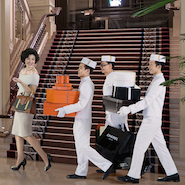Nearly 80 percent of affluent Asian consumers plan to increase spending on travel, according to a new report from Agility Monitor.
While it is no big secret that spending and travel are on the rise in China and elsewhere in Asia, consumers nonetheless plan to stay regional, with Hong Kong, Tokyo and Osaka, Japan being the most popular destinations among all affluent Asian travelers. While some preferred destinations are already luxury hubs, others offer opportunities for brands to be among the first shopping destinations in the locale.
“Luxury retailers need to have insights and information about these travelers to work around their needs and choices,” said Amrita Banta, managing director of Agility Research.
“Luxury shopping has seen a steep rise in Japan given all the Asian travel there recently; however luxury brands need to appeal to the travelers as a whole so they connect with them and can be a preferred choice at home and abroad,” she said.
“These affluent asian travelers are looking for good service/quality and uniqueness, and thats what luxury brands needs to provide – local Chinese speaking staff, ability to communicate on WeChat, etc.”
“Affluent Insights Travel Consumer Report” surveyed 2,441 affluent individuals in eight Asian markets. The income level qualifying affluence varied with each market but generally hovered around the equivalent of $100,000 and the top 20 percent based on annual household income in the market.
New markets
Tokyo and Osaka are high destinations in part because of the declining value of the Yen. Japan also has unique cultural traditions, and Tokyo is an established luxury hub, making it ideal for both sightseeing and shopping.
Notably, Osaka is not seen as a market for luxury consumers. Tokyo is especially popular among ultra-high-net-worth individuals, and its rapid development, high population and economic prosperity have made it a primary market for luxury brands, but that success has not traveled beyond the city.
For affluent Chinese in particular, the Maldives is the number one most planned future travel destination. The Maldives is a popular resort home to numerous luxury hotels, including a Four Seasons, with a St. Regis set to open on Sept. 1 and a Ritz-Carlton to follow, but is not known for its shopping.
However, more than half of consumers surveyed prefer to purchase luxury goods and determine vacations based on the availability of luxury shopping. Despite these numbers, Chinese consumers said that nature experiences and eco-tourism are among the top three desired travel activities, preferences that contribute to the Maldives’ popularity.
Given the popularity of both shopping while traveling and the Maldives’ popularity, which seems poised to stay given the interest in eco-tourism, partnerships with luxury hotels or otherwise establishing a more visible presence in the Maldives should be considered for luxury brands looking to expand.
However, the top reason for traveling is still related to experience rather than products. Location-specific items or collections are a recommendation from the report that can help tie luxury products to the local experience to encourage purchase as mementos or souvenirs.
Hotels stand to benefit from ever-increasing interest in luxury travel. Half of respondents said they would only stay in four- and five-star hotels.
However, hotels need to further familiarize themselves with consumers by market, as the nature of luxury travel is not universal. For example, Singaporeans average 3.1 leisure trips per year, while Indians have the highest rate of “bleisure,” or business trips with a few days of leisure on either end.
Moreover, 65 percent of Indian consumers, as well 38 percent of Chinese compared to 34 percent overall, prefer condos or houses to hotels. Luxury hotels must find ways to close the gap that home amenities, namely kitchens, offer to travelers by emphasizing hotel-exclusive elements of great service or highlighting high-end suites.
Also included in the report is a luxury brand index showing how each brand is meeting expectations, an analysis of media reach and further segmentation of consumers based on purchase behavior and motivations.
New customers
Overall, China’s outbound luxury travelers spend $65,000 per household on tourism per year, including $34,000 on travel shopping, according to a recent study from the Hurun Research Institute and Marriott International.
Chinese outbound tourists have long been a high-priority group for luxury brands, but the demands and habits of younger travelers are changing quickly. The digital natives aged between 18 and 36 years old want a more personalized experience, including superior guest services and smart device integration (see story).
Hotels will need to alter their strategy in order to take advantage of the new influx of travel are from abroad.
Affiliate sites and online travel agencies have kicked brands out of first-page search results, according to a May 2016 L2 report.
Across 452 non-branded keywords, TripAdvisor had the highest first-page display rate by a significant portion, and similar sites and online travel agencies (OTAs) dominated the top 10. To make themselves visible to prospective travelers researching online, brands must make themselves visible on these sites and target consumers by region (see story).
“Luxury hotels again need to understand the needs of the traveler,” Ms. Banta said. “A younger traveler has different needs to an older one with kids: service and quality are both key to this traveler, as is a desire for unique and customized experience, including connecting with them on WeChat and WhatsApp.
“We have seen a rise for local cultural experiences in our research over the years, as well as local culinary dining/fine dining asides from shopping,” she said. “The other thing that emerged strong in our research across was that security now plays a very important part in their choice of destination given some of the incidents that have happened in Paris and Istanbul.
“But luxury shopping and traveling still go hand-in-hand, especially for travelers from China and India.”
from Travel and hospitality – Luxury Daily https://www.luxurydaily.com/asian-consumers-preferred-travel-destinations-reveal-retail-expansion-opportunities/
via Your #1 Source to Finding Luxury & Designer Goods, Handbags & Clothes at or Below Wholesale: Click Here.



No comments:
Post a Comment